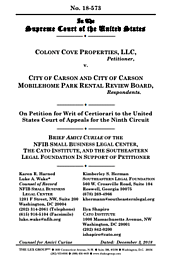Learn more about Cato’s Amicus Briefs Program.
Colony Cove Properties, LLC owns a rent-controlled mobile home park in Carson, California. Property owners may apply annually to the city and its Mobile home Park Rental Review Board for rent increases. In evaluating rent-increase applications, staff follows an ordinance and guidelines that require balancing the need to allow property owners a fair return on their investments while maintaining below-market rents. This requires comparing various expenses submitted by property owners against the property’s income to determine what rents would provide the owner with a fair return.
When Colony Cove purchased its mobile home park in 2006, the guidelines allowed the board to consider acquisition debt service—interest payments made on a loan to purchase the rent-controlled property—when assessing whether to grant a rent increase, but only if “the purchase price paid was reasonable in light of the rents allowed under the Ordinance and involved prudent and customary financing practices.” After Colony Cove purchased the park and before it was permitted to file its first rent-increase application, respondents amended the guidelines to not count acquisition debt service as an operating expense. Because of this amendment, respondents ultimately approved rent increases grossly insufficient to cover Colony Cove’s annual operating expenses.
Colony Cove alleged that respondents’ retroactive application of the amended guidelines was a taking without just compensation in violation of the 5th Amendment. A jury returned a verdict in Colony Cove’s favor, but the Ninth Circuit reversed the jury’s verdict, holding that Colony Cove had failed to show sufficient evidence at trial to support a regulatory taking under Penn Central v. New York, the case that established the framework for evaluating regulatory takings.
Cato has joined the NFIB Small Business Legal Center and the Southeastern Legal Foundation in filing an amicus brief supporting Colony Cove’s petition for certiorari to the Supreme Court. We argue that this Court should provide guidance as to how the parcel-as-a-whole rule should function in a Penn Central analysis for a temporary takings claim. Generally, when evaluating a regulatory taking, courts look to the impact of the regulation on the “parcel as a whole,” not on discreet segments. In the context of a temporary takings claim, however, we argue that the analysis must focus on the economic impact of the restriction during the imposition rather than on the value remaining after a temporary restriction is lifted. Any other rule would completely vitiateFirst English, which held that if a regulation amounting to a taking is withdrawn, the claimant would still be entitled to just compensation for the period the regulation was in effect.
We also argue that the Court should clarify what it means for landowners to obtain a “reasonable return” on their investments. Penn Central failed to define the term and lower courts are confused. The Penn Central test offers virtually no guidance as to what showing is necessary to satisfy the Penn Central factors, or how heavily the factors should be weighed in the equation. The Court should provide greater direction and predictability in regulatory takings cases or affirm that the Penn Central factors may be evaluated and weighed by a jury, which is uniquely capable of resolving such mixed questions of fact and law.

This work is licensed under a Creative Commons Attribution-NonCommercial-ShareAlike 4.0 International License.
